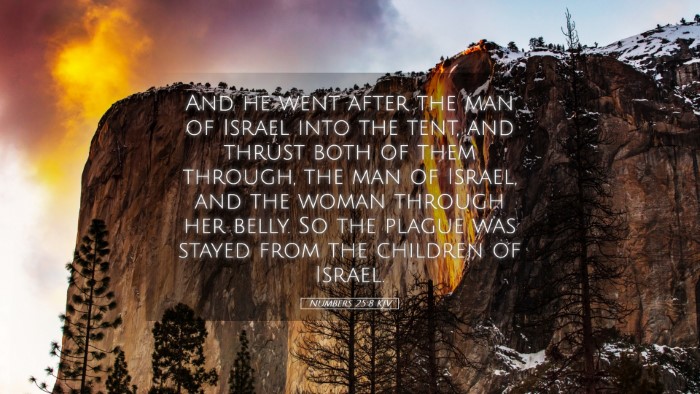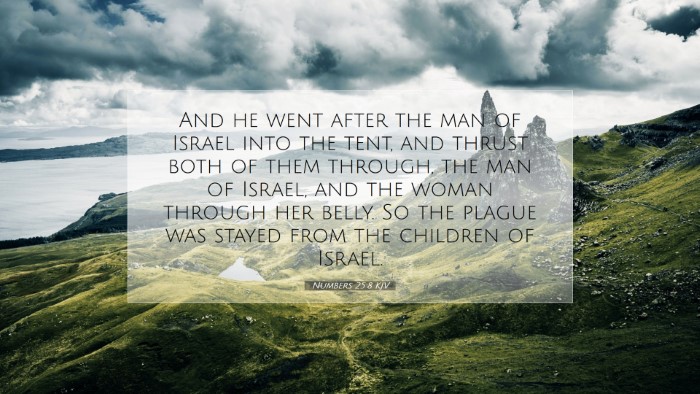Commentary on Numbers 25:8
Numbers 25:8 states: "And he went in after the man of Israel into the tent, and thrust both of them through, the man of Israel, and the woman through her belly. So the plague was stayed from the children of Israel."
Introduction
The narrative in Numbers 25 is a significant episode in the wilderness wanderings of Israel, showcasing both divine judgment and the zeal for holiness. This passage reveals the devastating consequences of idolatry and immorality, underscoring themes of obedience, divine judgment, and the effects of sin upon the community. As we explore this verse, we will draw from noted commentators to provide a comprehensive understanding suitable for pastors, students, theologians, and Bible scholars.
Contextual Analysis
In the preceding verses, we learn that the Israelites began to indulge in the worship of Baal, a pagan deity of Moab, which led them into sexual immorality and idolatry. The gravity of this situation prompted God to enact judgment upon His people. It is in this setting that Phinehas, the grandson of Aaron, emerges as a figure of zeal and righteousness.
Commentary Insights
The Role of Phinehas
According to Matthew Henry, Phinehas’ actions were motivated by a profound zeal for God's honor, which was being sullied by the unfaithfulness of Israel's leaders and people. His swift and decisive action against the sinful couple illustrates a righteous indignation, a reflection of the holiness of God and the seriousness with which He regards sin. Henry emphasizes that the zeal manifested here is not merely for personal vindication but for the restoration of covenant faithfulness among the people of Israel.
The Nature of Judgment
Albert Barnes notes that the act of thrusting both individuals through signifies the severity of God's judgment regarding sin. The violence of the act serves as a stark reminder of the consequences of idolatry and immorality. Barnes explains that this judgment effectively halted the plague among the Israelites, demonstrating that divine mercy often accompanies judgment, providing a pathway for restoration and reconciliation with God.
The Symbolism of Thrusting Through
Adam Clarke extends the understanding of the imagery used in this act. He reflects on the spiritual ramifications of being "thrust through," highlighting that this act can symbolize the cutting off of sin and its deadly consequences. Clarke argues that this is illustrative of God’s desire to root out evil from His people to maintain holiness within the camp. The symbol of the belly, in particular, may indicate the interiority of sin — that which is hidden and nurtured, brought to the forefront by the act of judgment.
Theological Reflections
- The Zeal of God’s People: Phinehas' act serves as a powerful example for the Church today. It challenges believers to pursue holiness with vigor and to address sin within their communities actively.
- God’s Judgment and Mercy: This passage reinforces the tension between divine judgment and mercy. While God's anger leads to severe consequences for sin, His intervention brings about healing and restoration for the community.
- The Cost of Sin: The narrative teaches that sin has real and often devastating consequences, not only for the individual but for the entire community. This serves as a critical reminder for contemporary believers about the nature of sin and its impact.
Conclusion
Numbers 25:8 presents a sobering reflection on zeal, judgment, and divine holiness. Through the decisive action of Phinehas and the subsequent cessation of the plague, we see a clear picture of God's responses to sin within His people. As we contemplate these themes, it is imperative for pastors, students, theologians, and Bible scholars to meditate on the implications of this passage, urging us towards a life that honors God, upholds His holiness, and actively addresses sin within ourselves and our communities.


